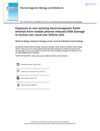
Antioxidant therapy, especially with selenium, can improve skin aging in patients with Metabolic Syndrome.
 16 citations,
November 2009 in “Experimental dermatology”
16 citations,
November 2009 in “Experimental dermatology” Ionizing radiation damages human hair follicles by stopping cell growth, causing cell death, disrupting color, and increasing stress and damage markers.
 September 2022 in “International Journal of Health Sciences (IJHS)”
September 2022 in “International Journal of Health Sciences (IJHS)” Low zinc levels may contribute to hair loss due to increased oxidative DNA damage.
99 citations,
September 2007 in “The American journal of pathology” Chemotherapy damages hair follicles, causing hair loss and other cellular changes.
 32 citations,
January 2022 in “International Journal of Molecular Sciences”
32 citations,
January 2022 in “International Journal of Molecular Sciences” Melatonin, a hormone, can help protect skin from aging by reducing stress, inflammation, and damage, and may also help treat hair loss in women.

Adequate vitamin D might lower, and high hair chromium might increase DNA damage in obese women.
 3 citations,
September 2023 in “Skin research and technology”
3 citations,
September 2023 in “Skin research and technology” New treatments for skin damage from UV light using stem cells and their secretions show promise for skin repair without major risks.
 January 2020 in “Asian journal of applied science and technology”
January 2020 in “Asian journal of applied science and technology” Good nutrition is crucial for health and preventing disease, and supplements can help prevent nutrient deficiencies.
37 citations,
November 2017 in “Medical Sciences” Melanoma's complexity requires personalized treatments due to key genetic mutations and tumor-initiating cells.
 1 citations,
July 2021 in “Current Issues in Molecular Biology”
1 citations,
July 2021 in “Current Issues in Molecular Biology” Father's finasteride use may affect son's fertility and testicular function.
 April 2015 in “Andrology”
April 2015 in “Andrology” HNG may help prevent the negative effects of chemotherapy on sperm production and white blood cell counts.
 February 2023 in “Asian journal of pharmaceutical research and development”
February 2023 in “Asian journal of pharmaceutical research and development” Flavonoids in Iraqi marshland plants have potential health benefits like antioxidant and anti-inflammatory effects.
 195 citations,
January 2008 in “Photochemistry and Photobiology”
195 citations,
January 2008 in “Photochemistry and Photobiology” Visible light can damage skin and most sunscreens don't block it well; more research is needed on its effects and protection methods.
 9 citations,
October 2008 in “Mutation research”
9 citations,
October 2008 in “Mutation research” N-acetyl-L-cysteine (NAC) can prevent DNA damage and protect cells from harm.
48 citations,
September 2020 in “Frontiers in Immunology” Loss of OGG1 increases skin inflammation and auto-antibodies in lupus.
 215 citations,
March 2018 in “Archives of Toxicology”
215 citations,
March 2018 in “Archives of Toxicology” Tiny pollution particles called PM2.5 can harm skin cells by causing stress, damage to cell parts, and cell death.
 53 citations,
October 2014 in “Free radical biology & medicine”
53 citations,
October 2014 in “Free radical biology & medicine” Defective mitochondrial DNA replication causes aging symptoms and increased oxidative damage in mice.
 295 citations,
March 2016 in “Life Sciences”
295 citations,
March 2016 in “Life Sciences” Air pollution worsens skin diseases and aging by causing inflammation and oxidative stress.
 104 citations,
January 2016 in “Food & Function”
104 citations,
January 2016 in “Food & Function” Olive oil compounds may help prevent cancer in animals, but human results are mixed.
 31 citations,
February 2019 in “International Journal of Cosmetic Science”
31 citations,
February 2019 in “International Journal of Cosmetic Science” Caffeine applied to the scalp can protect hair follicles from UV damage.
 70 citations,
March 2008 in “Mechanisms of Ageing and Development”
70 citations,
March 2008 in “Mechanisms of Ageing and Development” Maintaining DNA health in stem cells is key to preventing aging and tissue breakdown.
1 citations,
July 2014 in “The journal of investigative dermatology/Journal of investigative dermatology” Light affects skin health, aging, and cancer risk, and new light-based treatments and imaging are promising for skin care.
 25 citations,
April 2018 in “Electromagnetic biology and medicine”
25 citations,
April 2018 in “Electromagnetic biology and medicine” Mobile phone radiation may cause DNA damage in human ear hair follicle cells.
 53 citations,
January 2009 in “Journal of Investigative Dermatology”
53 citations,
January 2009 in “Journal of Investigative Dermatology” UVB radiation harms hair growth and health, causing cell death and other changes in human hair follicles.
 22 citations,
November 2014 in “Psychiatric Clinics of North America”
22 citations,
November 2014 in “Psychiatric Clinics of North America” Stress can worsen skin conditions and affect mental health, so doctors should include stress management in skin treatment.
 28 citations,
August 2015 in “Journal of Drug Targeting”
28 citations,
August 2015 in “Journal of Drug Targeting” The new CoQ10 gel protects mouse skin better against aging from UV light than the old gel.

Intermittent fasting slows hair growth by damaging hair follicle cells.
 67 citations,
August 2013 in “International Journal of Cosmetic Science”
67 citations,
August 2013 in “International Journal of Cosmetic Science” Hair greying is caused by oxidative stress damaging hair follicles and melanocytes.
 October 2024 in “Annals of Dermatology”
October 2024 in “Annals of Dermatology” Korean Red Ginseng may help protect hair from damage and promote growth.
 10 citations,
March 2014 in “Scandinavian journal of clinical and laboratory investigation”
10 citations,
March 2014 in “Scandinavian journal of clinical and laboratory investigation” Malondialdehyde-modified DNA may trigger an immune response in alopecia areata patients.

























